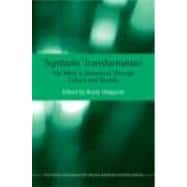
Note: Supplemental materials are not guaranteed with Rental or Used book purchases.
Purchase Benefits
Looking to rent a book? Rent Symbolic Transformation: The Mind in Movement Through Culture and Society [ISBN: 9780415488488] for the semester, quarter, and short term or search our site for other textbooks by Wagoner; Brady. Renting a textbook can save you up to 90% from the cost of buying.
| List of contributors | p. xi |
| Series Editor's introduction | p. xiii |
| Preface | p. xvii |
| Introduction: What is a symbol? | |
| Semiotic foundations | p. 17 |
| introduction | p. 19 |
| The intersubjective nature of symbols | p. 23 |
| Here comes the semiotic species: Reflections on the semiotic turn in the cognitive sciences | p. 38 |
| The unconscious as symbol generator: A psychodynamic-semiotic approach to meaning-making | p. 59 |
| Commentary on Part I. Are we connected to the Matrix machine? Cognition and experience figuring out what reality is | p. 75 |
| Transformations of experience | p. 87 |
| introduction | p. 89 |
| Experiencing symbols | p. 93 |
| Deep motivation and the work of culture in Christian penitential ecstasy | p. 120 |
| Remembering with others: The veracity of an experience in the symbol-formation process | p. 142 |
| Commentary on Part II. Imagination and the movement of meaning | p. 159 |
| Transformations through the life course | p. 167 |
| introduction | p. 169 |
| How does an object become symbolic? Rooting semiotic artifacts in dynamic shared experiences | p. 173 |
| Developing symbolic abilities | p. 193 |
| Scribble: The development of children's mark-making | p. 209 |
| Commentary on Part III. Some reflections on the development of symbolic activity | p. 232 |
| Transformations of identity | p. 241 |
| introduction | p. 243 |
| Symbolic group-play and social identity | p. 249 |
| Symbolic worlds in time/spaces of practice: Identities and transformations | p. 269 |
| From "stigma" and "coping" to social repositioning: A new perspective on HIV/AIDS, identity, and human rights | p. 284 |
| Diversity in sex workers' strategies for the protection of social identity: Content, context and contradiction | p. 302 |
| Commentary on Part IV. Identity and social reality: Formations and transformations | p. 323 |
| Conclusion: Opening and closing symbolic transformation | p. 330 |
| Index | p. 334 |
| Table of Contents provided by Ingram. All Rights Reserved. |
The New copy of this book will include any supplemental materials advertised. Please check the title of the book to determine if it should include any access cards, study guides, lab manuals, CDs, etc.
The Used, Rental and eBook copies of this book are not guaranteed to include any supplemental materials. Typically, only the book itself is included. This is true even if the title states it includes any access cards, study guides, lab manuals, CDs, etc.